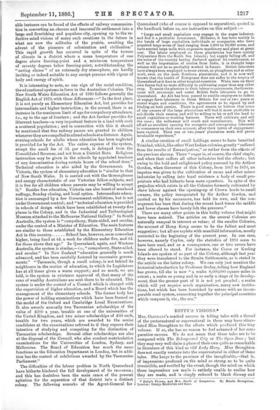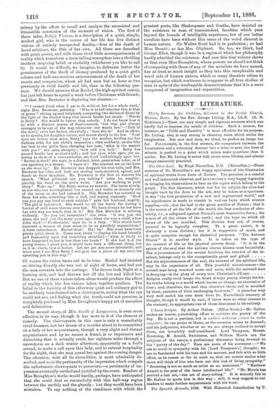BETTY'S VISIONS.• M.R.S. OLIPHANT'S marked success in telling tales with
a thread of the preternatural or supernatural in them may have stimu- lated Miss Broughton to the efforts which produced this tiny volume. If so, she has no reason to feel ashamed of her com- parative success. We do not mean that these tales are to be compared with The Beleaguered City or The Open Door ; but they may very well claim a place of their own quite as remarkable in literature of this kind as Old Lady Mary. Miss Broughton does not exactly venture into the supernatural in either of these tales. She keeps to the province of the inexplicable,—that is, of impressions produced on the mind so strong as to be quite irresistible, and verified by the event, though the mind on which these impressions are made is entirely unable to realise how they are made, and is simply reduced to blank dismay and
• Betty's Visions, and Mrs. Smith of Longmaina Bj Rhoda Broughton. London : George Roatledge and S0113. misery by the effort to recall and analyse the unresisted and irresistible conviction of the moment of vision. The first of these tales, Betty's Visions, is a description of a quiet, simple, modest girl, who in the course of her life has five distinct visions of entirely unexpected deaths,—four of the death of loved relations, the fifth of her own. All these are described with great power, and with those vivid little accompaniments of reality which transform a mere telling conception into a thrilling
incident inspiring belid or credulity (whichever you like to call it). It would be difficult, we imagine, to delineate better the genuineness of the thrill of dismay produced by a quiet girl's solemn and half-unconscious announcement of the death of her cousin and companion, whom all had seen but an hour or two previously in vivid health and life, than in the following pas- sage. We should premise that Rachel, the high-spirited cousin, has just left home to spend a week before Christmas with friends, and that Mrs. Brewster is deploring her absence :—
"' I cannot think what I am to do without her for a whole week,' sighs Mrs. Brewster, pettishly. Who is to tell whether this is blue or green ?' sitting up and helplessly comparing two skeins of filosel by the light of the shaded lamp that stands beside her couch. Where is Betty ? She would be better than nobody. I do not know how it is,' with a distinct access of fractiousness, ' but that girl always manages to be out of the way whenever one wants her.'—' Talk of the devil,' cries her father, cheerfully ; here she is.' And in effect, as he speaks, his daughter enters, and moves slowly to the fire. Your eyes are better than mine, Betty,' says the mother, holding out her dubious silks for her child's inspection ; then suddenly, as she lifts her look to the girl's face, changing her tone, what is the matter with you 7' she asks, abruptly ; how odd you look ! ' Betty has paused beside her mother's sofa ; and her eyes, wide open, yet un- seeing as those of a somnambulist, are fixed unthinkingly upon her. Rachel is dead,' she says, in a distinct, level, passionless voice, as of one speaking in a dream. ' I know it ! She touched me on the knee as she went by.' Mr. Brewster has dropped his coat-tails, and Mrs. Brewster her silks, and both are staring open-mouthed, aghast, and dumb at their daughter. Mr. Brewster is the first to recover his speech. What gibberish are you talking ?' cries be, roughly ; putting his hand on the girl's wrist. ' Are you walking in your sleep ? Wake up !' But Betty makes no answer. She turns slowly, as one who has accomplished her errand, and walks as dreamily out of the room as she had entered it. Mrs. Brewster has tottered up from her sofa, trembling like a leaf, and crying copiously. 'How can you pay any heed to such rubbish ?' asks her husband, angrily. The girl is hysterical. She would b3 all the better for having a bucket of cold water thrown over her. We have always let her have her own way too much, that is it.' Bat Mrs. Brewster is sobbing violently. 'Do you not remember ?' she cries. It was just the same, she said just the same years ago, when she was a child, when John died.'—' Fiddlesticks,' says he, in a fury. ' Who would have expected a woman of your sense to be so puerilely superstitious ? A mere coincidence. Rachel dead ! Ha! ha! She must have been pretty quick about it. Come now, think '—(laying his hand friendly and reasonably upon her trembling shoulder) —' what is likely to have happened to her in less than two hours ? If she had lead the young horses, I grant you, it would have been a different thing, but as it is—there, that is better. Let me get you some ealvolatile, and when next I see Miss Betty I will give her a piece of my mind for upsetting you in this way.' "
Of course the vision turns out to be true. Rachel had insisted on driving directly she was out of sight of home, and had put the men-servants into the carriage. The horses took fright at a burning rick, and had thrown her off the box and killed her- But no one of these visions taken alone would produce the effect of reality which the five visions taken together produce. The belief in the liability of this otherwise quiet and ordinary girl to be suddenly transformed into a clairvoyante, seeing what the eye could not see, and feeling what the touch could not perceive, is completely produced by Miss Broughton's happy art of narrative and delineation.
The second story, of Mrs. Smith of Longmains, is even more effective in its way, though it has more in it of the element of
comedy. The clairvoyante in this case is only a remarkably vivid dreamer, but her dream of a murder about to be committed on a lady of her acquaintance, though a very slight and distant acquaintance and by no means a friend, is so impressive and disturbing that it actually sends her eighteen miles through a snowstorm on a dark winter afternoon, apparently on a fool's errand, to make a call upon this lady, and to entreat hospitality for the night, that she may guard her against the coming danger.
The situation, with all its absurdities, is moat admirably de- scribed, and so is the pertinacity of the impression which compels the unfortunate clairvoyante to persevere,—a pertinacity of im- pression eventually verified and justified by the event. Readers of Miss Broughton's works would hardly, perhaps, have anticipated that she could deal so successfully with this half-way region between the earthly and the ghostly ; but they would have been mistaken. To say nothing of the steadiness with which the greatest poets, like Shakespeare and Goethe, have insisted on the existence in man of transcendent faculties which pass beyond the bounds of intelligible experience, few of our better novelists have been without this sense of the weird element in human nature. Sir Walter Scott had it in perfection ; so had Miss Brontë ; so has Mrs. Oliphant. So, too, we think, had George Eliot, though it was in a, region of which her philosophy hardly admitted the existence. And now this tiny volume shows us that even Miss Broughton, whose powers we should not think of comparing with those of any of the novelists we have named, has at least as much insight as they into this inexplicable and weird side of human nature, which so many theorists refuse to recognise, but which continues to reappear in all true studies of man in spite of the irrefragable demonstrations that it is a mere compound of imagination and superstition.



































 Previous page
Previous page